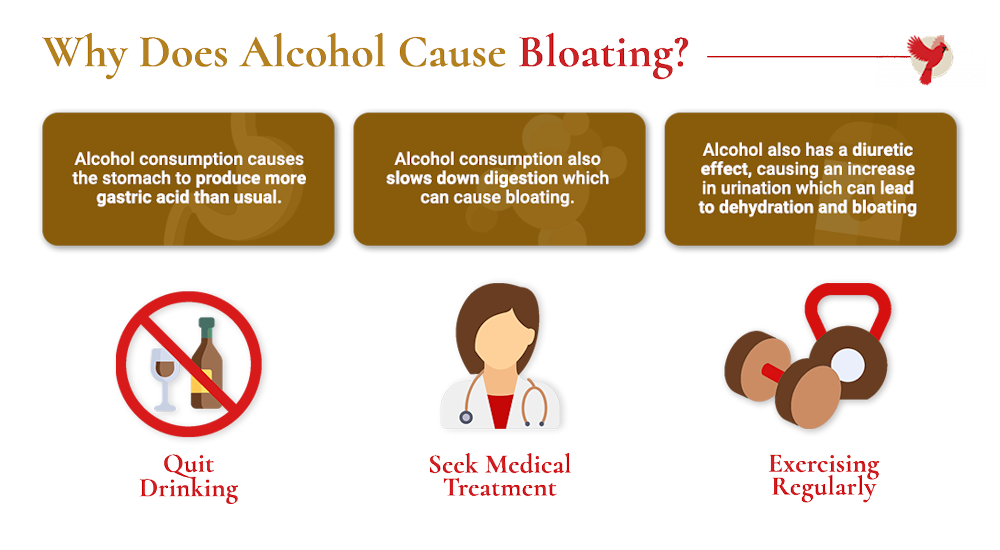How Long Does Alcohol Bloating Last?
Alcohol bloating typically lasts for a few hours after your last drink. However, depending on how much alcohol you consume, the effects can last longer. For example, if you drank heavily over an extended period of time, it could take days for your body to recover and for the bloating to subside. Additionally, the severity of the bloating can vary depending on the type of alcohol consumed. Generally speaking, drinks that are higher in sugar tend to cause more bloating than those with less sugar.
When it comes to alcoholism, there are many ways it can impact the body. One of these is very common among those who abuse alcohol. Abdominal bloating is all too common among those who struggle with alcoholism. This is extremely difficult to manage when someone drinks alcohol regularly.
Table of Contents
ToggleRisks of Drinking Heavily on the Body
 In general, it’s best to try and reduce your risk for developing alcohol bloating in the first place. This means drinking in moderation and avoiding sugary cocktails when possible. Additionally, drinking plenty of water and eating a balanced diet can also help reduce bloating and maintain good overall health.
In general, it’s best to try and reduce your risk for developing alcohol bloating in the first place. This means drinking in moderation and avoiding sugary cocktails when possible. Additionally, drinking plenty of water and eating a balanced diet can also help reduce bloating and maintain good overall health.
Finally, it’s important to remember that alcohol bloating isn’t the only risk associated with drinking too much. Drinking heavily can lead to other serious health problems such as liver damage, increased blood pressure, heart disease, and even cancer. Therefore, it’s important to always drink responsibly and seek medical help if you experience any signs of alcohol-related illness or disease.
What is Bloating?
Stomach bloating is a common condition in which the abdomen becomes visibly swollen after consuming a meal or drinking alcohol. It can cause uncomfortable sensations, such as fullness, tightness, and even pain. It may also be accompanied by trapped gas and belching. Stomach bloating can have many causes, including overeating, certain medical conditions, and intolerance to certain foods or beverages. Treatment for stomach bloating depends upon the underlying cause.
Lifestyle changes such as diet adjustments, physical activity, and stress management can help reduce symptoms of bloating. In more severe cases, medications may be necessary for symptom relief. If you are experiencing persistent bloating that does not improve with lifestyle changes, it is important to speak with your doctor. They can help determine the underlying cause and provide you with an appropriate treatment plan.
How Does Alcohol Impact Stomach Health?
Alcohol can have a significant impact on the health of your stomach. Short-term, excessive alcohol consumption can lead to inflammation of the stomach lining (gastritis), increased acid production and an increased risk for developing ulcers. Long-term abuse of alcohol can also lead to serious digestive issues, including pancreatitis, liver disease, and other nutritional deficiencies.
In addition to these direct effects, alcohol can also impair your digestive system’s ability to absorb nutrients, particularly B vitamins and iron. This can lead to serious deficiencies that can affect other organs in the body and cause fatigue or muscle weakness. Furthermore, drinking large amounts of alcohol over long periods of time may also increase your risk of certain cancers, such as colon or rectal cancer.
The effects of alcohol on the digestive system can also extend beyond physical issues. Drinking too much can lead to impaired judgment, which may result in poor eating habits or increased intake of unhealthy foods. This can further exacerbate existing digestive problems and create a vicious cycle that is difficult to break.
Finally, alcohol consumption can also increase your risk of developing an infection in the digestive tract. This is because alcohol is a known irritant and can inflame and damage the lining of the stomach and intestines, making it more susceptible to bacterial invasion. If left untreated, these infections can cause serious health issues.
Does Alcohol Cause Bloating?
Alcohol consumption can cause bloating for several reasons. When alcohol is consumed, it causes the stomach to produce more gastric acid than usual and can also slow down digestion. This leads to an uncomfortable feeling of fullness, as well as gas and bloating. In addition, certain alcoholic beverages like beer are high in carbohydrates which can further contribute to bloating.
Alcohol also has a diuretic effect, causing an increase in urination which can lead to dehydration. Dehydration can cause bloating as the body retains water to compensate for the lack of fluids. Finally, drinking alcohol can disrupt your sleep cycle, and poor sleep is a known risk factor for developing bloating symptoms.
Can Alcohol Abuse Lead to Weight Gain?
Alcohol abuse can lead to weight gain in several ways. Firstly, alcohol contains a large amount of calories and can quickly add up if consumed regularly. Secondly, many alcoholic drinks are high in sugar which leads to an increase in calorie intake. Thirdly, drinking alcohol can reduce the body’s ability to burn fat efficiently, leading to an increase in body fat. Finally, alcohol consumption can lead to poor lifestyle choices such as eating unhealthy food and reduced physical activity, which also contributes to weight gain.
Therefore it is important for those who are prone to alcohol abuse to monitor their drinking habits and consider the impact that this could have on their health, including weight gain. In order to maintain a healthy weight, limiting the amount of alcohol consumed is recommended.
Additionally, it is important to be mindful of what other foods and beverages are being consumed alongside alcohol, as these can add additional calories which could lead to an increase in body weight. Finally, engaging in regular physical activity can help to counteract the impact that alcohol has on weight gain. By paying attention to these factors, individuals can ensure that their drinking is not having a negative impact on their health and weight management.
Are There Treatments for Alcohol Bloating?
There are treatment options available for alcohol bloating. Some of the most common treatments include the following:
- Quitting drinking – Eliminating your intake of alcoholic beverages could help stomach bloating cease.
- Making dietary changes – Eating smaller meals more frequently and avoiding foods that may contribute to bloating, such as high-sodium or processed foods.
- Taking over-the-counter medications – Such as anti-gas medications and supplements that can help with digestion and reduce bloating.
- Exercising regularly – Getting regular exercise can help improve your digestion and reduce your risk of developing an abdominal distension.
- Seeking medical treatment – If your bloating is severe or persistent, you may need to seek medical treatment to treat the underlying cause. This can include antibiotics for infections, medications to treat irritable bowel syndrome (IBS), or surgery in extreme cases.

How Can Quitting Drinking Help Stomach Bloating?
Quitting drinking can help reduce stomach bloating in many ways. Alcohol is known to irritate the lining of your digestive tract, which can lead to inflammation and bloating. Additionally, alcohol can cause dehydration, resulting in water retention and further swelling of the abdomen. Cutting out alcohol from your diet can help reduce these uncomfortable symptoms.
How Do Dietary Changes Impact Stomach Bloating?

Eating certain foods can lead to bloating, while altering your diet can help reduce the discomfort. Foods that are high in fat and sugar, as well as processed foods and simple carbohydrates such as white bread or pasta, can cause stomach bloating. Drinking carbonated beverages and chewing gum also contribute to bloating. Eating large meals can also cause bloating, so it is important to eat smaller meals more frequently throughout the day.
In contrast to foods that can cause bloating, some dietary changes can help reduce stomach bloating. Eating a balanced diet that includes plenty of fruits and vegetables, whole grains, lean proteins, nuts and seeds will provide your body with essential nutrients while helping to reduce bloating. Eating slowly can also help to reduce bloating, as it will give your body time to digest the food properly and prevent air from being swallowed.
Drinking plenty of water can also help with digestion and regularity. Avoiding foods that are known to cause gas, such as beans and lentils, is also helpful in reducing stomach bloating. Limiting the intake of processed and fried foods can also be beneficial, as they are often harder to digest.
What Over-the-Counter Medications are Available for Stomach Bloating?
Over-the-counter medications for stomach bloating include antacids, probiotics, anti-gas medications, and acid reducers. Antacids, such as Tums or Rolaids, can help neutralize excess acid in the stomach and reduce bloating. Probiotics are beneficial bacteria that can help restore balance in your gut, improving bloating and other digestive issues. Anti-gas medications such as Beano or Gas-X can help reduce excess gas and pressure in the stomach that causes bloating.
Finally, acid reducers such as Pepcid or Zantac can help reduce the amount of acid produced in your stomach, reducing bloating symptoms. If over-the-counter medications don’t help, speak to your doctor about prescription options. They may be able to offer medications specifically designed for bloating relief. Some lifestyle modifications can also help reduce bloating and other stomach issues. Eating smaller meals throughout the day instead of large meals can help improve digestion and reduce gas buildup. Drinking plenty of fluids can also help move food through your digestive tract.
Treatment is Available for Alcoholism – First City Recovery Center Can Help
There are plenty of treatment options available for alcoholism at First City Recovery Center. If you or a loved one would like to find out more, you can contact us here.

MD, Psychiatrist
Dr. Vahid Osman, MD is a psychiatry specialist in Indianapolis, IN.
Dr. Osman completed a residency at Austin State Hospital. He has over 32 years of experience in Psychiatry & Behavioral Health. He is board certified by the American Board of Psychiatry and Neurology.






